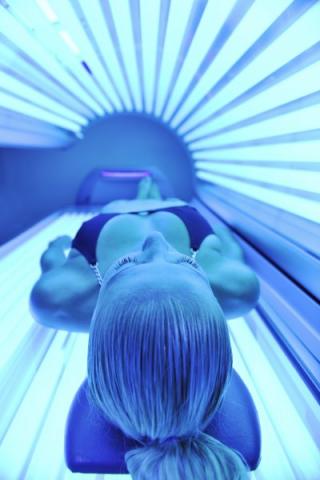Don’t be tempted to give your skin a roasting!

Sunbeds are a popular way to top up a fading summer tan or to get one in time for the Christmas party season, but with evidence of health risks associated with sunbed use, the Public Health Agency (PHA) and Cancer Focus Northern Ireland are encouraging people to think twice before using them – it isn’t worth the risk.
Dr Miriam McCarthy, Consultant in Public Health at the PHA, said: “Modern sunbeds work by exposing the user to UV radiation which can be the equivalent of Mediterranean sunlight at midday in August.
“Research shows that using a sunbed once a month or more can increase the risk of developing skin cancer, and using sunbeds before the age of 35 years can significantly increase the risk of developing melanoma skin cancer. It’s vitally important that people are aware of the risks associated with sunbed use, and it’s also important that businesses understand the law.
“Young people who have 'binge sessions' in tanning salons are at particular risk. But even occasional use may lead to cancer, premature aging and eye damage. While people under the age of 18 are legally not allowed to use sunbeds, they may have access to sunbeds owned or rented by family and/or friends – this should be discouraged, and remember there is no safe level of sunbed exposure.”
Trudy Stanfield, Chair of the Sunbed Working Group, said: “Sunbed legislation was introduced in May 2012 and is enforced by district councils. It states that operators of sunbed premises mustn’t allow anyone under 18 to use a sunbed, must provide customers with information on the risks associated with sunbed use, and must ensure protective eyewear is available.”
Marbeth Ferguson, Skin Cancer Prevention Co-ordinator at Cancer Focus NI, said: “In the last five years skin cancer diagnoses have increased by almost 20% and the fashion for having tanned skin has certainly contributed to this situation. There are still people who are ignoring the risks and choosing to use sunbeds. We advise that no one should use sunbeds for cosmetic purposes.
“If you are concerned about skin cancer, for example a mole that has changed in shape, size or colour, you should talk to your GP. Early detection of skin cancer can significantly improve survival so regularly checking your skin is important."
For further information on sun safety see www.careinthesun.org
Notes to editors:
1. Skin cancer is the most common cancer in Northern Ireland and accounts for 30% of all cancers diagnosed here - around 3,550* people develop it each year. While most skin cancers are not malignant the most severe form, malignant melanoma, can be a potentially life threatening condition, particularly if not diagnosed in the early stages. (* average number per year from 2008-2012. Ref. NI Cancer Registry)
2. It is important to check skin regularly for suspected skin cancers. Check the whole body as skin cancer can occur in places not normally exposed to the sun. Be aware of any new spots, or existing spots that have changed colour, size or shape. A skin cancer may be a spot that bleeds easily, never heals properly or is always itchy. If an unusual spot is identified, show this to a doctor. Most skin cancers can be treated successfully if treated early.
3. The Public Health Agency is the lead organisation for the implementation of the Skin Cancer Prevention Strategy and Action Plan 2011-2021 launched in July 2011.
4. Building on the work of the former Northern Ireland Melanoma Implementation Group (NIMSIG), a Skin Cancer Strategy Implementation Group, jointly chaired by the Public Health Agency and Cancer Focus Northern Ireland, has been established to take forward the six objectives contained in the Strategy and Action Plan.
5. The Skin Cancer Strategy Implementation Group is a multi-agency group which includes representatives from the Public Health Agency, Cancer Focus Northern Ireland, the Department of Health, Social Services and Public Safety, Environmental Health, General Practice, Pharmacy, the Belfast Health & Social Care Trust, the Northern Health & Social Care Trust, the South Eastern Health & Social Care Trust, the Southern Health & Social Care Trust, the Western Health & Social Care Trust, the Health & Safety Executive Northern Ireland and the Northern Ireland Cancer Registry.
